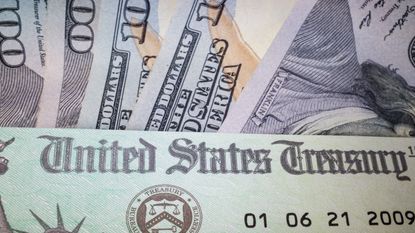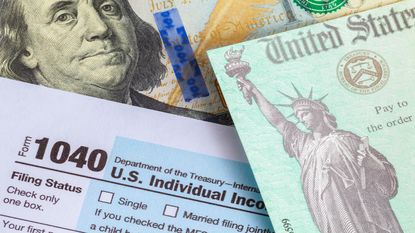
The IRS is sending out another round of stimulus payments. Here's what you need to know about the third stimulus check with your name on it.
When you purchase through links on our site, we may earn an affiliate commission. Here’s how it works.

The IRS started sending third stimulus check payments in batches shortly after President Biden signed the American Rescue Plan Act on March 11. And, so far, the tax agency has sent over 150 million payments. But many Americans — especially those who haven't received a check yet — still have a lot of questions about the third-round stimulus checks. At the top of the list: How much will I get? And when will I get it?
Fortunately, we have answers to these and other frequently asked questions about your third stimulus check. We also have a nifty Third Stimulus Check Calculator that tells you how much money you should get (everyone's payment will be different). Read on to get the answers you need to the questions you have. Once you know more about your third stimulus check, you can start figuring out how you can use the money to your advantage.
(Stay on top of all the new stimulus bill developments – Sign up for the Kiplinger Today E-Newsletter. It's FREE!)

Question: How many third-round stimulus checks will I get?
Answer: As with the first two round of checks, the legislation authorizing the third round of payments only calls for one payment. This is not a "recurring" payment situation.
However, some people will receive a supplemental payment if their 2020 tax return is filed and/or processed after the IRS sends them their regular third stimulus check. The IRS is calling these "plus-up" payments, and they'll only be sent if your regular stimulus check would have been higher if it was based on your 2020 tax return (instead of on your 2019 return or some other information obtained by the tax agency). So, for example, if you received a $700 third stimulus check based on the information found on your 2019 return, filed your 2020 tax return later, and your third stimulus check would have been for $800 if it was based on information from your 2020 return, then the IRS will send you a second payment for the $100 difference.
Some married couples could also get two payments. If a joint tax return is filed, a married couple could get two separate third stimulus payments. Half may come as a direct deposit and the other half will be mailed to the address the IRS has on file. Each spouse should check the IRS's "Get My Payment" tool separately using their own Social Security number to see the status of their payments.

Question: How much money will I get?
Answer: Everyone wants to know how much money they will get. You probably heard that your third stimulus check will be for $1,400 — but it's not that simple. That's just the base amount. Your check could actually be much higher or lower.
To calculate the amount of your check, Uncle Sam will start with that $1,400 figure. If you're married and file a joint tax return, then both you and your spouse will get $1,400 (for a total of $2,800). If you have dependents, you get an additional $1,400 for of them. So, for example, a married couple with two children can get up to $5,600.
Now the bad news. Stimulus payment amounts will be phased-out for people at certain income levels. Your check will be gradually reduced to zero if you're single with an adjusted gross income (AGI) above $75,000. If you're married and file a joint tax return, the amount of your stimulus check will drop if your AGI exceeds $150,000. If you claim the head-of-household filing status on your tax return, your payment will be reduced if your AGI tops $112,500. You won't get any payment at all if your AGI is above $80,000 (singles), $120,000 (head-of-household), or $160,000 (joint filers).
Also note that the IRS, which is issuing the payments, will look at either your 2019 or 2020 tax return for your filing status, AGI, and information about your dependents. Because of this, the amount of your third stimulus check could depending on when you file your 2020 tax return.
If your 2020 tax return isn't filed and processed by the time the IRS starts processing your third stimulus check, it will use your 2019 tax return to get the necessary information. If your 2020 return is already filed and processed, then your stimulus check will be based on that return. However, as noted earlier, if your 2020 return is not filed and/or processed until after the IRS sends you a stimulus check, but before August 16, 2021 (or September 1 if the May 17 filing deadline is pushed back any further), the IRS will send you a supplemental "plus-up" payment for the difference between what your payment should have been if based on your 2020 return and any payment actually sent based on your 2019 return.
Again, we have an easy-to-use Third Stimulus Check Calculator to help you figure out the estimated amount of your check (based on your 2019 or 2020 return). Check it out!

Question: Will my third stimulus check be taxed later?
Answer: No. As with the first two rounds of payments, your third stimulus check is actually just an advanced payment of the Recovery Rebate tax credit for the 2021 tax year. As such, it won't be included in your taxable income.
You also won't be required to repay any stimulus check payment when filing your 2021 tax return — even if your third stimulus check is greater than your 2021 credit. If your third stimulus check is less than your 2021 credit, you'll get the difference when you file your 2021 return next year. So, it's a win-win situation for you!

Question: When will I get my third stimulus check?
Answer: Millions of Americans have already received their third stimulus check. And the IRS will be sending out more over the next several weeks. So, if you haven't received your payment yet (assuming you're eligible for a payment), it should arrive relatively soon.
How long it will take to send all payments is not known yet. The IRS has a lot on its plate right now. We're in the middle of tax return filing season, so the IRS is already busy processing tax returns. The tax agency also has to send refunds for people who reported unemployment compensation on their 2020 return and come up with a way to send periodic child tax credit payments later this year. All of this could very well slow down the processing and delivery of third-round stimulus checks.
If the IRS already has your bank account information — either from a recent tax payment that you made, a tax refund it sent you, or some other source — then expect to get your third stimulus check faster. That's because the IRS will be able to directly deposit the payment into your bank account. The IRS can also make a third stimulus payment to a Direct Express debit card account, a U.S. Debit Card account, or other Treasury-sponsored account. Otherwise, you'll get a paper check in the mail.
If you already have a prepaid debit card from the IRS (e.g., for a first- or second-round stimulus check), you'll get a new card if the IRS decides to send your third stimulus payment to you in that form. (But just because you received a debit card for an earlier stimulus payment doesn't mean you'll automatically get one for the third payment.)
You can check and track the status of your third payment by using the IRS's "Get My Payment" tool. The website is available in English and Spanish.
Finally, since the stimulus payments are automatic for most eligible people, don't bother calling your bank or the IRS to ask about the timing of your payment — that won't make it come any sooner!

Question: What if I don't file a 2019 or 2020 tax return?
Answer: Some people don't file a tax return because their income doesn't reach the filing requirement threshold. If that's the case, the IRS will send a third stimulus check based on whatever information, if any, is available to it. That information potentially could come from the Social Security Administration, Railroad Retirement Board, or Veterans Administration if you're currently receiving benefits from one of those federal agencies. If that's the case, you'll generally receive your third stimulus payment the same way that you get your regular benefits. (Note that, if your third stimulus check ends up being paid to a representative payee or fiduciary, the entire payment can only be used for your benefit.) If you supplied the IRS information last year through its online Non-Filers tool or by submitting a special simplified tax return, the tax agency can use that information, too.
Some people who receive a third stimulus check based on information from the SSA, RRB, or VA may still want to file a 2020 tax return even if they aren't required to file to get an additional payment for a spouse or dependent.
If the IRS can't gather enough information about you to send you a third stimulus check, you won't lose out on the money — you'll just have to wait until next year to claim it. As we already noted, the checks that will be sent now are really just advance payments of the 2021 Recovery Rebate tax credit. So, if the IRS doesn't send you a third stimulus check, you can claim it as a refund or reduction of the tax you owe when you file a 2021 tax return (you can file a return just to claim the payment). You'll have to file your return, or request an extension, by April 18, 2022.

Question: What if I had a child in 2021?
Answer: Unfortunately, if you had a child in 2021, you won't get an additional $1,400 in your third stimulus check for him or her. That's because your new bundle of joy wasn't claimed as a dependent on your 2019 or 2020 tax return. You can, however, get an additional $1,400 Recovery Rebate credit for your new baby on your 2021 tax return.